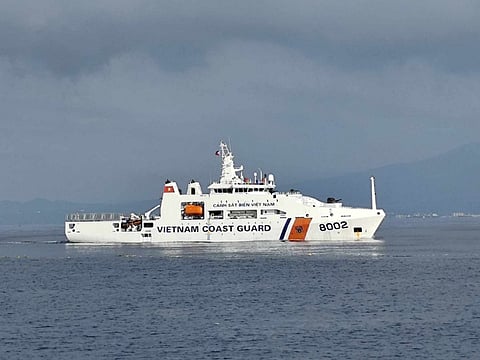
- NEWS
- the EDIT
- COMMENTARY
- BUSINESS
- LIFE
- SHOW
- ACTION
- GLOBAL GOALS
- SNAPS
- DYARYO TIRADA
- MORE

The Philippine Coast Guard on Sunday said the Vietnam Coast Guard ship, CSB 8002, is set to hold a four-day port call in Manila this week.
PCG Commandant Admiral Ronnie Gil Gavan said the VCG’s port visit in the country fostered mutual understanding and enhanced cooperation between the Philippines and Vietnam.
Meanwhile, PCG spokesperson Rear Admiral Armando Balilo said the CSB 8002, which will stay in Manila from 5 to 9 August, comprises approximately 80 crew on board.
Balilo said the PCG will hold a low-key arrival ceremony on Monday, followed by a VCG’s courtesy call to the PCG Commandant at the National Headquarters and a fellowship sports activity at the PCG Gymnasium.
He added that the PCG and VCG will then hold a planning conference for the search and rescue (SAR) and fire and explosion prevention training.
“There will also be a facility visit at the National Coast Watch Center (NCWC) and Marine Science Investigation Force (MSIF) Laboratory, as well as a vessel tour on board the 83-meter offshore patrol vessel, BRP Gabriela Silang (OPV-8301),” Balilo further noted.
Balilo said the VCG will conclude the port call with the conduct of a passing exercise in the vicinity waters of Manila Bay.
“CSB 8002 will depart the Philippine waters after a comprehensive debriefing and evaluation of the joint PCG-VCG initiative,” he added.
Earlier this year, Gavan was with President Ferdinand “Bongbong” Marcos Jr. in visiting Hanoi, Vietnam where they tackled strong bilateral relations between the PCG and VCG.
On 30 January, the PCG and VCG formally signed the memorandum of understanding on maritime cooperation that strengthens their understanding, mutual trust, and confidence.
Under the MOU, both coast guards agreed to develop a Joint Coast Guard Committee (JCGC) to open common issues and interest discussions as well as establish a hotline communication mechanism.
Gavan emphasized both nations’ pursuit for continuing strategic partnership between their Coast Guards “toward promoting, preserving, and protecting their mutual interest in the Southeast Asian region.”
